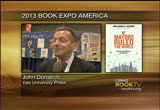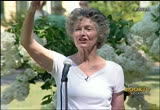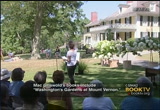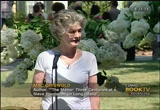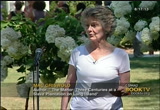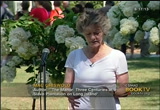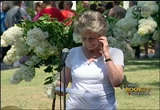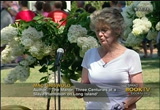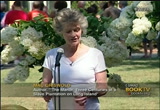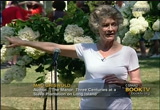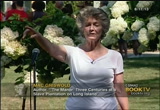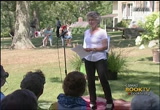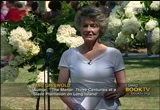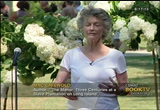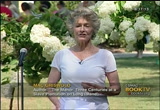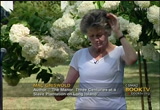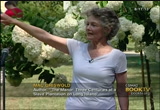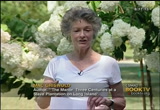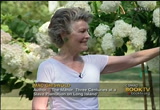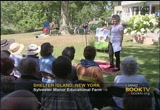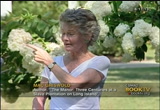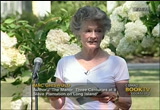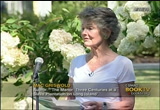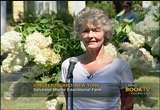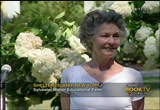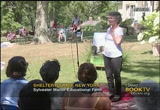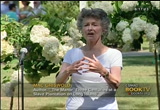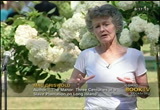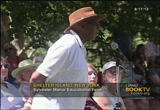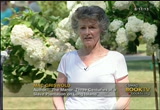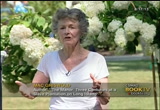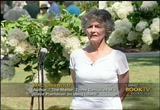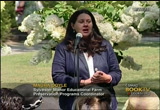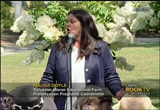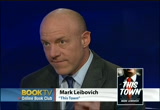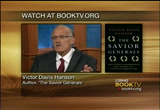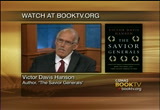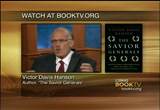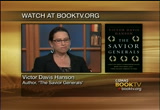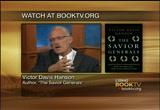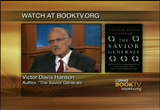tv Book TV CSPAN August 25, 2013 2:00pm-2:46pm EDT
2:00 pm
world; bangkok, london, hong kong. fascinating stuff. >> host: and david bentley hart has a new book. >> guest: he wrote a book ca ca ca -- a couple years ago where he looked at what he called the angry atheists, people like christopher hitchens, daniel dennett and richard dawkins and wondered why in this particular moment there was such hostility to religion by some of our public intellectuals. in this book he really wants to get aside from the politics of it all and look across most of the denominations to the experience of god. how people across different can faiths understand god as an emotional and spiritual presence in chair lives. -- in their lives. and it's a gorgeous book. he's an amazing writer, i think one of the great stylists. and this is a real opportunity to sit with a major theologian and wonder about how god is experienced across faiths.
2:01 pm
very emotionally true book, spiritually rich and, i think, a real eye-opener. very pleased about it. >> host: and that's a quick look at some of the books coming out by yale university press this fall. >> booktv continues now with mac griswold. he presents a history of a mansion on shelter island, new york, that was built in 1652 and owned by the same quaker family, the sylvesters, for 11 generations. this is about 40 minutes. [applause] >> thank you all for coming. thanks for, many thanks to those of you who are suffering in the sun. soon the shade of asa gray's copper beach will shade you gently, so i promise to speak long enough for that to happen. [laughter] now, every endeavor like this that spans so many years is a collaborative effort, and we are
2:02 pm
very lucky here today to have richard rabinowitz who's going to come up and say a few words, because it is he and linda kaplan, both of the american history workshop, who pioneered the story of northern slavery and particularly in new york with the two great shows at the new york historical society. and so richard's going to set the context for just a minute, and then i'll come back on stage and tell you about the book. [applause] >> i'm thrilled to be here with you today. this is a great day of convergence. this is the convergence of a book that has been growing for 20 years and has brought so many people and so much knowledge and so much wisdom together. it's also, of course, a celebration. this is really a great, this is a site-specific book, and this is a great site of convergence. because all of you are sitting
2:03 pm
and standing on one of the most important historic laces in north america -- places in north america. because here right, just right on our ground africans and europeans and american indian people came together and really began to work together to create an american civilization and an american society. in the first, really this is one of the very first times that this happens. so it's happening right here, and under this ground the archaeological investigation has shown evidences of the way these three cultures came together. so it's a very exciting thing to be welcoming mac's book back to this site. and she, of all the historians and scholars that i've worked with over many years, has such a profound sense of sight and of -- of site and of place. as you have heard, she has gathered material for this from around kentuckys -- archives on
2:04 pm
four continents and brought together an extraordinary kind of learning. but the thing that makes her unique is her ability to see and to capture through her eyes a kind of sense of how landscapes work. so it's a great pleasure for me to be here today and to share with you the convergence of this book and this site. thank you. [applause] >> richard, thank you so much. that's great praise. now, he used the operative word "see," and towards the end of my talk today i want you to see five of the people who walked here. i want them to rise up out of the ground or row their way across this inlet. so after i've finished talking and when you've bought your book, i want you to walk around ask have those shades go -- and have those shades go with you, because they are here. that's why i call this talk
2:05 pm
"visible/invisible." it's the only place i can do this talk. can you all hear me? good. so at sylvester manor on shelter island in new york, what's visible? a serene, 18th century house in its landscape whose owners played honorable roles in the revolutionary war and in the civil war. they built this fine house -- can you still hear me? am i doing all right? they built this fine house, only the second one on the site. it's a rambling, comfortable dwelling now that was extended northward in the late 18th century and in the 19th century from the original, elegant georgian house, newport style, which is the a center block with the hip roof and the two big chimneys. the piazzas were added in 1908 as was this little portico over
2:06 pm
the front door. so what do we foe about what we see? the sylvesters raised their children, 11th generation inherited the house in 2006. 243 acres. they've poured callow candles, they planted gardens, and they planted and cut down trees. one of them corresponded with thomas jefferson about a common wheat pest. they wound the great english grandfather clock that still stands in the hall. it chimed and kept time for them through the years. they embroidered bed hangings. they churned butter which they sold as far as newport, rhode island, and even down to barbados. imagine eating butter that had made a six week trip. [laughter] they spun flax and wove cloth, and they wrote down their own thrifty yankee recipe for shoe
2:07 pm
polish. all the details of colonial life that we've come to appreciate as american. and as the centuries passed, they invested wisely in new american ventures; the erie canal, in railroads and began know mines off the -- began know minds off the coast of south america. they toasted each other from a silver tankard now in the metropolitan museum of art which was purchased from the money made from their successful economic add ventures. adventures. now, what's invisible is equally a part of our national history. sylvester manor is a cradle of the system of slavery, as richard said, that became a national system throughout new england as throughout the south, as far west as texas. in 1680 nathaniel sylvester, an englishman brought up in amsterdam, and his english wife counted 24 people as their property, the largest number in the north at the time, 11 men
2:08 pm
and women and 13 be children. many had african names. others had creole names which tells you that they had come through other places besides africa. they had, they'd been transported to the west indies or to brazil. it could be a name of french origins, jacques, the o ending tells you it probably has some hispanic other connotation. conjure with it as you like, that's jacquero. the slave labor produced the first town of wealth for the sylvesters from the sugar trade. on shelter island they tended hogs and cattle to butcher for salt meat, they bred and broke horses to power the sugar mills and cut trees to make casks which were really the shopping bags of the day. you couldn't do anything with sugar unless you had a barrel to
2:09 pm
put it in. you couldn't do anything with rum unless you had a barrel to put it in. you couldn't do anything with molasses unless you had a barrel to put it in. the staves that were cut here were shook down which means that they were separated into all their many parts, tied, shipped aboard out of this tiny harbor off to a bigger harbor at deering head where there's 47 feet of water and where the big ships lay off to be loaded with all the provisions to go down to the west indis and be to come back with all the sugar products and with the slaves who landed probably at that site at the water landing, right there. go down and take a look. is that mine? oh, good, okay. doesn't matter. so sugar, molasses and rum came back to the manor, and it was an experiment in early global
2:10 pm
capitalism, and it was a successful one. the first sylvesters who brought brought -- who bought the entire island as a business proposition, not as a home, had credit in the markets of amsterdam and london. the governor of connecticut borrowed 400-pound sterling from nathaniel's brother giles who lived in london when winthrop won short of cash in london. he was waiting for the patent that would give him his colony of connecticut. what to us comes as a shock, as it did to me when i first realized it in the quiet friends' library in london, was the sylvesters' faith. they were among the very first handful of quakers in the world. they believed in the inner light, the sanctity and worth of individual worship. how could they have held, bought and sold human beings as slaves? the answer is very simple.
2:11 pm
for nearly a century after quaker found toker george fox received his first fiery vision from the lord, the friends -- like everyone else who could do so -- held slaves, dealt in slaves. in 1758 the philadelphia meeting was the first to outlaw slavery among its own members. by then the sylvesters were no longer quakers, but they were still slave holders. and they remained so until 1820 when london, was his name, london, the last person they held in perpetual bondage was released. slavery ended in new york state in 1827, only 34 years before the nation was split by the civil war in 1861. though slavery as a system disappeared, the hawj shadows of prejudice -- huge shadows of prejudice, economic disparity and governmental injustice remain today. take a look at north carolina voting laws voted in on
2:12 pm
thursday. in my years of research, i have come across many who have walked on this ground in my research, and i'd like to conjure up a few of them for you this amp as i've done in the book -- this afternoon as i've done in the book. look that way, and you'll see 1654, he and 17 other members of the montauk ets are coming here to witness a deed for a piece of land in oyster bay. they are wearing an amalgamation of european and native american costume. wine dance was a tall man who carried himself well, and he's coming up to meet nathaniel sylvester who's standing rather nervously right there. that's rather a lot of up standing and outstanding native americans for him to meet on his own soil. so down there dyer.
2:13 pm
how many people know who mary dyer is, raise your hands. okay. mary dye canner was the english woman who was a quaker and what was called a public friend. and she came here in 1659 when the quakers were being persecuted in boston by the puritans. and this place was a haven for the quakers. they held slaves, yes, but they also protected the quaker friends as they were harried from south hole to new haven to salem and on to boston. mary dyer is down there, and she's thinking about whether she should go back to boston from which she'd been banished on pain of death. and eventually, she climbed into a little boat -- maybe the same little boat that you see on the back coffer of my book -- cover of my book, and she sailed off to boston, and nathaniel knew that she was going to her death. and she did too. and she was hanged on boston
2:14 pm
common in may of 1660, and she was hanged from a gallows when the wind blew through her skirt -- very rare to have a woman hanged -- when the wind blew through her skirt, and it shivered a little bit in the breeze, somebody said she hangs like a flag. and somebody else said, she hangs like a flag for man to do justice by. and that happened, it was the last of the hangings in boston. now, over there by the farm which you may have seen as you came in walking through the garden, you may have seen some big farm buildings, there's an african. young man standing here, maybe 15 or 16 years old, and he is hearing the news that he, at the division in 1680 of his, of all the possessions of nathaniel
2:15 pm
sylvester, he's going to be shipped to boston away from his community and away from all his friends. so he goes to boston, and the only way -- because these lives are so hard to parse out -- the only way that we know that he tried to free himself is from a tiny dry note in an account book. it says one pound sterling paid for the horse that obium ran away with. now think this through. was the young black man on a horse galloping wildly, what's he doing? somebody's going to stop him, and they did. they took him to oyster bay, long island, and there he met a woman called rose. he stayed in slavery for the rest of his life. he died sometime after 1757. a long life, 1680, 1757. so we're moving forward now.
2:16 pm
and rose and obium's son is the first published african-american poet, jupiter hammond. so the ties that stretch out from this place not just back to africa and to europe, but also forward into muscle and sinew of our own country, are pretty remarkable. mary sylvester. be quiet for a minute, because if you are quiet, besides hearing the voice of the tour guide, you will also hear the sound of mary burrows sylvester screaming, and she's asking where her children are. where are my children? underneath the genteel facade of this house and behind the image of this lovely woman in the 1740s and '50s is the tirg of madness. -- is the figure of madness. she was so mentally ill that quite unusually for the age when most people would have stayed at
2:17 pm
home in their families no matter how crazy they were, mary was taken off to westchester county and institutionalized there. she came back home. treatment was of no use. she died in 1750, and i've found this out only in a sermon published about her husband who was a very loving and marvelous husband. you read the letters that he wrote to his daughters who were then living not on the island any longer, and you see how much he cared for this poor, mad woman he would write to his daughters, your poor mother is not well. and you can see from the institutional records what that actually meant. although we don't know what it is that she suffered from. so there she was in her silk dress, and in the house we are lucky to know about all the
2:18 pm
rooms of this house, all the rooms and what was in them. and in one small space about twice the size of this participant which is called the darkroom in the inventory, you find a cheaper bed but not the cheapest kind of bed. it would have been a bed for a valued house slave or, given the treatment programs of the time, it could have been mary sylvester's bed where she was incarcerated in the dark. there was no window there. so what was suitable for a slave was also suitable for a mad woman. think about that. speeing on here -- speeding on here, fanning is walking over the north peninsula. he was a free man, and he had a last name. he'd been freed after the death
2:19 pm
of his owner in laurel, maryland, and he was sold 21 acres of land on the north side of shelter island ten days before the man who sold him the property fell off his horse and died. some things are lucky. now, he had paid this man, sylvester deering, who grew up in this house, he paid him $750. huge amount of money. we till don't know -- we still don't know how in his earnings as a hireling slave which happened quite frequently in the north by 1800 which is when he would have started amazing all this money -- amassing all this money, we still don't know how he made it. but the creek, who knows where second bridge is? raise your hands. raise your hands, okay. the lane runs across second
2:20 pm
bridge up there, and just beyond it is the most beautiful piece of land on the island, i think. it has the most beautiful view of the harbor and where fanning's land was, those acres, looking right out at the harbor. that is land that would cause a a -- that would cost, as a reputable real estate dealer said today, $7.5 million. alas, fanning's daughter sold that land. she did not have the learning, the education or the stature to realize that she should hang on to that property and pass it to a member of her family. so two very handsome, white-pillared houses on that property, and you'll find julia died as the image on spine of the book. by the late 19th century, manor
2:21 pm
belonged to a man who had married into the the family not once, but twice. he fathered four daughters. she died, the wife, and he married the sister, something that happened often in 9th century -- 19th century life. he was a harvard professor, a nutrition alchemist. he made several fortunes, one of them the mines that i mentioned off the coast of -- guano is bird manure -- off the coast of south america. and he invited the whole of cambridge intelligentsia down here. so over there under the beech tree is the great short story writer and her lover, annie fields. and they're walking hand in hand, and sarah jewish -- jewett is writing a poem. they were fond of celeb the cities.
2:22 pm
they even saved what they called queen victoria's shoe. not too sure whether it was queen victoria's shoe. but anyway, there's sarah and annie murmuring in the shade of the beech tree. and last of all i come to two of the horsefords' daughters, cornelia a who owned this house this 1903 and who made it into the house that she always imagined it should have been. henry -- help, richardson. not richardson, who's the architect of the lincoln memorial? bacon. thank you, laura. [laughter] henry bacon came and quickly recorded what the house was as built, and those papers along with all the other papers are now at nyu where they're part of the sylvester manor archive so that you can go there and see what the house was like when it was built, and you can also see
2:23 pm
what he did to it which included the piazzas and the front portico. cornelia was one of those 9th century women -- 19th century women who should have had a better education. she somehow transformed the manor into -- she was a single woman all her life at a time when it was like having one leg. so this house, more or less, became her other leg. and she became, as she called herself, the lord of the manor. the person that i prefer is her sister, lillian horseford, who was a wonderful writer, who made these incredibly lucid sketches including one of the pump over there where the two white hourses -- white houses stand. and lillian wrote a memoir of her grandfather, samuel smith gardener of the gardener family of gardener's island, who lived
2:24 pm
here. and she wrote it in 1921. so those two sisters, cornelia died in 1944 and lillian who died in 1927, brought this place into the 20th century. so i'm going to read to you what lillian had to say about the manor in 1921. both cornelia and her sister lillian occasionally felt burdened by the weight of history and by a disquieting suspicion that some things might not have been exactly as they had imagined. they felt the sorrow, they felt the sorrow of learning about the instability that lies at the heart of all things. such emotions may have be ghosted up in stray remarks and slight gestures stirring the supernatural magnetic strangeness that every visitor to sylvester manor feels.
2:25 pm
lillian, who observed, recorded and recalled more objectively than her sister, her lucid pencil sketches contrast with cornelia's impressionistic water colors, wrote a memoir that she read aloud at her society meet. she told of her fears as an 8 or 9-year-old as real as childhood can make such fears. when she threw a pebble against a glacial boulder in a field and a spark flashed, and then she sniffed a slight smell of what, she writes. we thought it was brimstone. her memoir went on. we thought the flash was the fire of hell ask that we had discovered -- and that we had discovered an entrance. we never played there again. [laughter] we never spoke of it again. heaven or hell, sylvester has been both, and i hope you'll read about it in pages of my
2:26 pm
book. thank you so much. [applause] what am i doing? oh, yes, q&a. and i'm doing it? yeah, okay. so anybody, anybody who has questions, please, come to the young lady in the striped shirt. i hope you have questions, and speak into the microphone there. and here comes a question. good. and i'd be be happy to try to answer them. hi. can you all hear her? >> [inaudible] >> okay, me too. >> my question is -- oh, it's on. my question is this.
2:27 pm
i have the book, and as i was going through the book, i was kind of puzzled as to why you referred to native americans throughout the book as indians, although you in your talk say native americans? i'm just curious. >> well, i looked at a lot of usages, and i used "the new york times"' usage which changed about five years ago. they began to call native americans indians. and i've spoken to many of the people out here who are or indigenous, and they say they like being called indians. so i honor them. [laughter] another question, please. oh, somebody -- [laughter] annie, you have to go back to
2:28 pm
the mic. >> hello. >> hello. >> i also have the book. >> thank you. >> and i haven't b finished it yet, but i'm working on it. >> okay. >> and i'm curious, i mean, this is an immense history, and there's a lot of different stories that go over this, i'm sure, that you came across. i'm just wondering why you choose -- why you chose to focus so much or why you chose to write about the slavery part of it. why did you choose that as your subject? because you actually put that on the coffer of the book, given the immense history of it. >> well, that's a wonderful question, and thank you so much for asking it. when i first came to the this house, i met andrew fisk, and i walked into the paneled parlor, and i said where does that door go? and andy fisk said, to the slave staircase. this was in 1984, long before richard shows. and i certainly didn't though
2:29 pm
that the pad of wealth established in new england and established throughout this nation was the work of many black hands. so i thought that was a story worth telling about this place, particularly as i looked at the accounts and inventories where you would see people in that terrible shadow land of being both chattel and person, where they would be evaluated in one document as negro, 35 pounds and another, in another document he or she might be called jacquero or hannah or obium. so that was, my point was to look to the history and beginnings of the many strands and particularly the african strands that have made this place what it is today where we sit. finish thank you. yes, anna. >> i know you did a lot of
2:30 pm
excavations here, and they have been probably filled in. where were the main excavations? >> the thing that was so extraordinary was that in the circle -- you okay? in the drawn circle which is the first place that steve -- who was the head of the u-mass-team, who dug here for nine years of field schools, he put a spade in the ground or just a shovel. i don't know what it was called. it wasn't a trowel, it was a square divot, and out came this unbelievable richness. ..
2:31 pm
probably -- i don't want to make it to grant, but it was one of the 30 houses in this country at the time and the 1660's that had what was called the ports tower of the front. so all of the rich is that you find in the documents went into the nation. steve rescue one time said nothing is ever turn away. and that's what the archaeology will show. does that answer your question? somewhat. yes? >> hi. >> hi. >> could you address some what the relationship of this family to barbados, what it is that they did and their relationships that brought them here?
2:32 pm
>> great question. thank you. in 1642 -- that's going back now. the 1642 nathanael sylvester's brother purchased his first plantation acres on barbados. in 1646 nathaniel sylvester made a trip in august of that year just when the current was turning to take boats straight across to west africa and came back with slaves. at that time and the 1646 barbados and the planters their were going through the sugar revolution when sugar began to turn barbados' into the most profitable of all the colonies, of all the british colony's. so year after year, year after year the people on barbados, africans died on barbados and
2:33 pm
there were replaced. they were never been able until after 1838 they were unable -- never able to achieve the reproductive rate which meant that the people would reproduce on the island. so constance sylvester and that daniel sylvester and their two partners, one of very well-placed englishmen called thomas middleton who was on the committee for farm plantations, very useful place to have your partner if you were over here, but this place in 1651 for two reasons. one, they bought it as a bolt hole for political instability. in 1651 the cavaliers and the roundheads were hard work fighting each other on barbados, even though king charles the first had his head chopped off in 1649. the barbarians were still at it. it looked like maybe constant and thomas middleton were going to be out of luck.
2:34 pm
they thought, well, let's by this 8,000-acre island the does not cost much. it's only a quarter of a teaspoonful of sugar per acre. as opposed to land on barbados at the same time, which was, i think, cap and a half if i have the right figure in my book. so the first africans to arrive here came as the property of sylvester is part of proportion or gallery. so they were turned her property. is the supple? okay. that was a connection which only lasted -- i'll wrap up here then. it only lasted until the next generation. so from 1646 and 1651 when they bought it until 1680 when nathaniel died. there were a few other purchases
2:35 pm
of sugar, rum, and africans after that, but it was not a continuous trade. he drank a lot of mount gay rum, and i drink it with her. [laughter] if there are no more questions. okay. zero. sorry. yes. >> during your research, did you find the emphasis of the master across the reading with the slaves? >> i did not. i looked for it everywhere. i cannot say that i am sure it occurred, but given the likelihood i would say it may well have. i did not find any. that's all i can say. anybody else?
2:36 pm
all right. [applause] i'd like to say a special thanks to more who fielded the soviet venture we had this afternoon. done a marvelous job. give her a hand. [applause] >> thank you for that. that was a phenomenon -- phenomenal. it's nice to see that the sun has been some intensive -- submission or people have sufficiently moved. thank you for being here today. they're is a loss in that this property is no longer being handed down in the same way it has been since 1652, but the advantage is that there is an organization here now that is dedicated to preserving what went down from 8,000 acres to the remaining 243 in making sure
2:37 pm
that we don't lose another one. and there is an organic farm that is planted here. we have history programming. we have plans to preserve the house, plans to restore carnelian and alices gardens. and so while the history and the narrative sort of comes to a sort of close and there is something -- there is a loss in that, there is something really exciting about the future that we expect to continue here for a long time. i invite you all to come back. we are open roughly alternate saturdays. mac but proved there are a spiralling history here. it goes off in all these incredible directions, and we're really looking forward to sharing the stories with all of you in the future generations to come, so we thank you for today. please sign up with the book signing which will be right over here. we will be sitting right here at
2:38 pm
this table. we look for to signing books. please do come c.s. again and again. thank you. [applause] >> that was lovely. >> i'm going to take my signing pan. >> is there and not fiction author or but you would like to see featured on book tv? send us an e-mail. or tweet us. >> when you write a book a lot can go wrong. this just sort of the way i approach the world. i'm somewhat neurotic in my riding and reporting, and a lot can go wrong. i have been pretty shocked by -- i guess, if there has been criticism from inside it has been mostly in the vein of how dare he. meaning how dare an insider give away the secret handshake. how dare an insider talk about
2:39 pm
other insiders in a way that, perhaps, might not be in keeping with because the we have in washington. and people keep asking me why people are uncomfortable here. i welcome the discomfort, but i also think this is journalism. this is what we do. >> book tv book club returns next month. read the book and engage on the facebook page and on twitter. look for daily book club pros starting september 3rd to get the conversation going, including discussion questions, like to interviews with the author, reviews of the book, and video. >> what inspired you to write a book about save your generals at this moment in time in history. >> we have this john rau, 19th century genre. we read about alexander great in hannibal. not so much, but napoleon and wellington, mom broke every
2:40 pm
three are supposed to distill lessons from the military genius. why did napoleon wind? why was he able to do the following? are we have the antithesis the 19th century anatomy, very popular, the 20th century, who are the worst generals. we don't really look at situations in which generals prevailed public in strategy or tactics, logistics', manpower, technology. they were put in an unenviable positions the my especially in consentual societies with public opinion and the bureaucracy of the elected technocracy that had given up. because i want to find people throughout history who should not have one and were not responsible for the big situation inherited, yet they prevailed. maybe they did not win it, but they saved it. >> i would love to go back and talk more about those great captains and the genres of history. first, i'd like to hear a little bit more about those huge dose.
2:41 pm
>> he save the b-2 nine campaign. george patton saved the american army after the humiliation of north africa. you can go on and on. i was looking particularly at situations that have chronological sweeps. themistocles of athens, all the way to add david patraeus and the surge, but i was also looking for things that were completely pessimistic. at think we could have won without patent or lemay, perhaps. but i don't think -- you take away themistocles from burnout athens and two-thirds of greek occupy, if there would have even thought. or without bill lasorda's the appeared -- emperor justinian would not have recovered much of the western byzantine / roman empire. i don't think there was a union general alive who could have taken atlanta at the cost that we took it, very small cost
2:42 pm
compared to what was going on in virginia. i don't know anyone who could have done what matthew ridgway -- i wish i could say there are american generals, maybe one or two, but not many could have done what david patraeus did. i was trying to lick it unique individuals throughout history chronologically that remind us that even a therapeutic, sociological era of high-tech, these human qualities remain constant across time and space. >> few leaders and historians would dispute that some of the people that you select were, indeed, saviors of their countries. i think a themistocles is a great example, undoubtedly. he said the greek city states. they might argue with some of your other choices. such as bridgeway. how do you respond?
2:43 pm
>> that criticism would be valid. there are no winners. for example, themistocles saved the greek cause, but it did not read the war. -- won the war. at the height of his power, but lasorda's was relieved, put on trial, died of a blind beggar, tradition says. as you point out with bridgeway, he was only their 100 days and made a strategic choice not to go across the 78 -- 38 parallel. he defended it in a very strange way. the american people were with macarthur when everything was going well. there are raced up to 400 miles. we had a great bugout. now they're behind me. if i go back to the north with
2:44 pm
the same strategic tactical situation, whether not that was true, i don't know, but there will turn on me because they're not willing to sustain this type of war this lot. in retrospect when we look at the threat of north korea today waking question ridgway's judgment. he felt that the time the nation was not in a political frame of mind to support what would be needed to crush the north koreans and chinese north of the 38 parallel. the same thing is true. he left it to others whether there were going to take that legacy, that inheritance and leave a residual force and try to make sure it became a consensual society in the way that we had done in the '40's and 50's and places like korea or serbia. we chose not to do that. i don't think that necessarily tarnishes his achievement.
2:45 pm
>> historian when the -- wendy lower discusses her soon-to-be published book "hitler's furies: german women in the nazi killing fields." she spoke to book tv at book expo america. we brought you several interviews over the past two weekends from the publishing industry's annual trade show and all of these can be viewed online at booktv.org. >> host: alan book tv a preview of professor wendy lower new book "'hitler's furies" -- "hitler's furies: german women in the nazi killing fields". professor, what is your book about? >> guest: it's about entire generations of german women. the world war one baby boomers. increased right after the first world war. about 1918, 1919 which coincided with german women getting the vote. you have a surge of the popu
62 Views
IN COLLECTIONS
CSPAN2 Television Archive
Television Archive  Television Archive News Search Service
Television Archive News Search Service 
Uploaded by TV Archive on

 Live Music Archive
Live Music Archive Librivox Free Audio
Librivox Free Audio Metropolitan Museum
Metropolitan Museum Cleveland Museum of Art
Cleveland Museum of Art Internet Arcade
Internet Arcade Console Living Room
Console Living Room Books to Borrow
Books to Borrow Open Library
Open Library TV News
TV News Understanding 9/11
Understanding 9/11